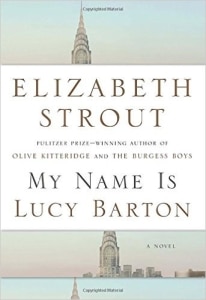 How do we tell our own stories of destruction?
How do we tell our own stories of destruction?
Author: Elizabeth Strout
The enticing Book of the Month video review praising the sparing elegance of poetic language and the depth of emotion between an estranged mother and daughter, reconnecting over illness, caused me to thrust aside my growing stack of “to-be reads” and instead start straight into My Name is Lucy Barton. Despite the tenderness that BoTM highlights in their review, the unembellished novel is more about brokenness and grief over childhood abuse and how these memories and this despair both defines us and ultimately dooms us. The story is a sad one, a depressing mélange of half remembered events, longings for love that will, inexplicably, never be given, and a silent scream for understanding and for clarity. Oscillating in a stream-of-conscious search for meaning the first person narrator (Lucy) fluctuates between believing that her childhood could not really, truly have been so bad and also attempting to deal with its very unnaturalness – her far from normal experiences that have defined life and relationships as she knows them. Likewise, the stigma of her severe childhood poverty leaves her now, even though financially comfortable, marked by her home town’s perception of her and her family.
The story begins with Lucy in the hospital, prey to an unnamed disease which has the possibility of being fatal. The treatment is difficult and long and Lucy’s husband, casually excused from visiting her because he dislikes hospitals, is out of the picture. This sets the ominous tone of how Lucy is treated by those who are, for all intents and purposes, supposed to love her. Her acceptance, her passive breezing over the absent husband and the aloneness sets the stage for readers to understand her true spirit of brokenness. The heart ache increases when her estranged mother randomly appears at her bedside, staying with her for several weeks before once again vanishing at a crucial point. Here, in this low state, Lucy becomes in many ways a child again, seeking the approval of her mother – the woman who cannot say “I love you.” It’s hardly a tender reconnection (sorry BoTM) but rather a story of how abuse, both psychical and emotional, leaves lasting agony on the marked individual. If you’re expecting the mother to say she is sorry, to explain, to even hint at recognizing what was done in the past, then your expectations are poorly founded and remain unsupported as Lucy at last comes to the reluctant discovery that there are no answers – at least none that she will be given.
This is both the irritating aspect of the novel and its strongest concentration. The writing, down to what some have called it’s amateurish straightforwardness (whereas others have equated this to poetry and the beauty of less-is-more writing) is about the confusion of the human soul, specifically as it relates to how others treat us and how this makes us perceive ourselves and what is “normal.” The confusion and pain feels very authentic to a gripping degree. We know Lucy and understand her at a level that supersedes language and the novel itself showcases how inadequate language is to supply the quagmire of feelings which we often drown in. Author Elizabeth Strout also captures the deadliness of silence and the desire to bridge an impossible gap, culminating everything into a short book with a great undercurrent and so many in-articulable elements which bubble and pop visibility on the surface, disturbing sanguine readers. It makes us think and it makes us grieve. Ultimately, I believe the purpose is to make us desire to tell our own stories of hurt, all the while acknowledging that we can never truly capture them or define them. Somehow, there is catharsis in the honesty, however fragmented it is by our own perceptions and uncertainty.
However, My Name is Lucy Barton is just as literary and thereby effecting as it is intellectually unsatisfying. With such a grip on our hearts and an atmosphere that conjures all those terrible, low moments in life where we have remained mute, the novel never truly delivers any details. We know that a clear-cut answer is not in the works. Indeed, it would probably ruin the realism of the piece and Lucy’s attempt to deal with the messiness of life. However, the abuse itself, the brief, half remembered moments from childhood are few and far between and there is never a clear picture of what Lucy is dealing with. What did her parents do? Understanding this, beyond just satisfying the prurient nature of the audience, seems essential to fully grasping the pain and her eventual, pseudo-decision regarding husband and writing.
Then, of course, the novel simply ends and we are left scratching our collective heads. After such a rocky emotional journey, it all appears later like a magic trick. We grieved over something that we never truly had a grasp on and this is both genius and exceedingly irritating. It takes a great novel and makes it merely “enjoyable.” It takes something that we could remember forever and makes it just a fleeting summer read. The substance is certainly here. The feeling, the verve, the pain, the introspection – it’s all there. Only the story is missing – and I’m talking about more than just a shaky outline punctuated with a few memories. My Name is Lucy Barton is a good read but it just needs . . . well . . . more.
– Frances Carden
- Book Vs Movie: The Shining - April 6, 2020
- Thankful For Great Cozy Mysteries - December 13, 2019
- Cozy Mysteries for a Perfect Fall - October 20, 2019


